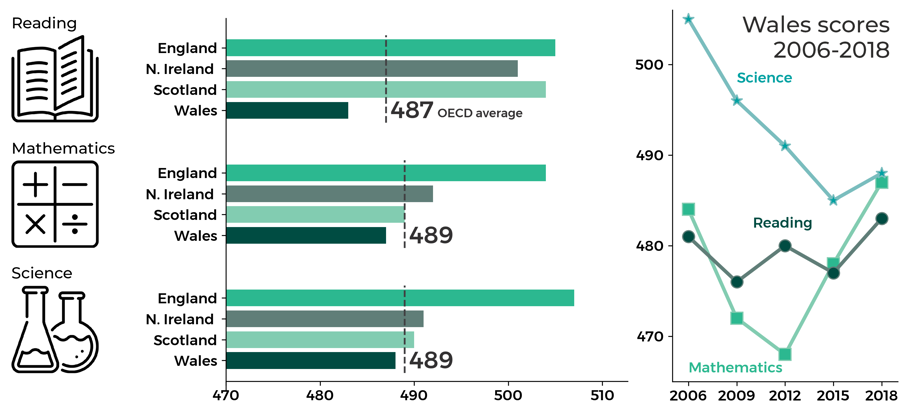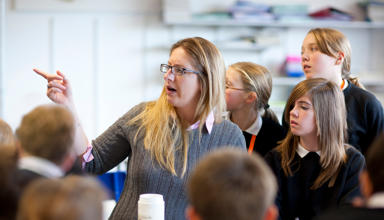On Tuesday (16 November), the Minister for Education and Welsh Language will make a statement in the Senedd on “Children’s Oracy and Reading”. This article discusses concerns about very young children’s speech and language development and progress against the Welsh Government’s long-standing priority of improving literacy skills amongst older pupils.
The importance of speech development in early years
Talk With Me, the Welsh Government’s two-year (2020-2022) plan to improve speech, language and communication support for children aged 0 to 4 years 11 months, states:
It is widely recognised that a child’s development in the early years is vital. This includes children’s acquisition of speech, language and communication (SLC) skills and oracy which underpins a child’s ability to read and write and to problem-solve. Positive cognitive development is strongly associated with a child’s success in school and entry into the workforce.
The Royal College of Speech and Language Therapists (RCSLT) has reported that coronavirus restrictions have worsened SLC delays amongst young children. Even before the pandemic, stakeholders expressed concerns that children from deprived backgrounds are more likely to be behind their peers in their SLC development by the time they start primary school.
Save the Children’s 2016 research indicated that nearly eight in ten (79%) Reception teachers in Wales often see children who join their school struggling to speak in full sentences. 89% of teachers surveyed said that children who start in Reception class with delayed speech and language skills fall further behind in their learning.
Save the Children previously reported in 2015 that children who struggle with speech and language in their early years are often still behind their peers in key literacy skills at age 11. An RCSLT submission to the Senedd in 2017 gives further details of concerns about SLC development, including the importance of the first 1,000 days of a child’s life and the negative impact of poverty.
Prioritising literacy at school age
Improving the literacy of school pupils has been a priority of the Welsh Government since the 2009 Programme of International Student Assessment (PISA) results provided, in the then Minister’s own words, a “wake up call to a complacent system”.
The Welsh Government introduced literacy and numeracy programmes and subsequently a framework in 2013, aimed at “raising the bar” in terms of expectations of pupils’ achievements in literacy and numeracy. Oracy, the ability to express oneself fluently and grammatically in speech, was one of the strands of the Literacy and Numeracy Framework, which was later incorporated into English and Welsh Language curricula.
The Welsh Government also introduced national tests in Reading and Numeracy (which evolved into Personalised Assessments), taken annually by pupils in Years 2 to 9.
Literacy will continue to be prioritised in the new Curriculum for Wales, forming one of three statutory cross-curricular skills alongside Numeracy and Digital Competence. It is therefore central to the Welsh Government’s ongoing school improvement agenda.
How well can 15 year olds in Wales read?
Reading is one of three main domains of the PISA tests, which Wales has taken part in since 2006. PISA, which is run by the Organisation for Economic Co-operation and Development (OECD) every three years, ranks countries’ education systems, based on the performance of a sample of 15 year olds.
The graphic below shows how Wales’ PISA score in reading has fluctuated during the five PISA cycles since 2006. In the latest results (2018), Wales’s reading score (483) remains the lowest in the UK and is further behind the other UK nations and the OECD average than the other two domains of mathematics and science, which are also the lowest in the UK.
Wales’ PISA scores in 2018 and previous cycles

Source: Extracted from National Foundation for Educational Research, Achievement of 15-Year Olds in Wales: PISA 2018 National Report (2019)
Because reading was the lead domain in 2018, which means there were more tests and greater analysis of results, there is a lot of information in the official report of Wales’ PISA 2018 results (see chapter 2). Here are some key points:
- Whilst there has been little improvement in Wales’ reading score since 2006, there are signs of relative improvement. In 2018, 22 countries had significantly higher scores than Wales. This compares with 30 countries outperforming Wales in 2015, 31 in 2012 and 29 in 2009.
- For the first time since PISA began, Wales’ reading score in 2018 was not statistically significantly different to the OECD average (this has as much, if not more, to do with the OECD average falling as it has to do with Wales’ score rising).
- There were four aspects to how reading skills were tested in PISA 2018: “locating information”, “understanding”, “evaluating and reflecting”, and “reading fluency”. Wales scored relatively well (relative to its overall reading score) in “locating information” and “evaluating and reflecting” and relatively poorly in “understanding”. In terms of “reading fluency”, Welsh pupils scored higher when scan-reading documents containing multiple pieces of text than those containing a single piece of text.
- Girls outperformed boys in reading, as in all other participating countries. In Wales, this difference was statistically significant unlike the gender differences in mathematics and science.
The previous Welsh Government had a target that Wales would reach 500 in its PISA scores by the 2021 cycle (now taking place in 2022 due to the pandemic). This requires a 17 point rise from its reading score in 2018. To put this into context, Wales reading score increased by six points between 2015 and 2018.
What does the schools inspectorate, Estyn, say?
Estyn reported this year on how children aged 3 to 11 develop their listening, speaking, reading and writing skills in English and Welsh-medium settings respectively. It said:
- Most children generally make strong progress and develop their language and literacy skills effectively.
- However, despite improvements in aspects of speaking, reading and writing, overall standards of language and literacy in primary schools are broadly similar to those reported on in 2016.
- The standard of learners’ writing in many primary schools remains the weakest of the four language skills (of listening, speaking, reading and writing).
- In most settings and primary schools, learners have positive attitudes to developing language and literacy skills. However, learners’ enjoyment in reading declines during their time in primary school. In English-medium schools, this is more prevalent among boys and learners from disadvantaged backgrounds.
- Most learners in Welsh-medium settings have positive attitudes towards developing their Welsh language skills. They are proud to communicate in Welsh, and understand the value and benefit of developing their Welsh language skills.
In his 2018-19 annual report Estyn’s then Chief Inspector of Education and Training wrote about the importance of speaking and listening to pupils’ literacy skills:
In general, pupils in primary and secondary schools do not always have enough opportunities to take part in learning experiences that focus specifically on talking, for example to improve their ability to question, challenge and build on the contributions of others through debate. In less effective schools, listening and speaking are viewed as skills that support reading and writing, rather than as skills that need to be developed in their own right. Frequently, teachers’ interventions and comments focus exclusively on what pupils are talking about rather than also on how they are saying it.
How to follow the Minister’s statement
The Minister is due to make his statement on “Children’s Oracy and Reading” in the Senedd at approximately 4.15pm on Tuesday 16 November. It can be watched live or any time later on Senedd TV. A transcript will be available on the Senedd’s Record of Proceedings around 24 hours afterwards.
Members and stakeholders may be interested to note whether the Minister refers to the target of reaching 500 points in Wales’ reading score in PISA and whether the Welsh Government still holds that target.
Article by Michael Dauncey, Senedd Research, Welsh Parliament






